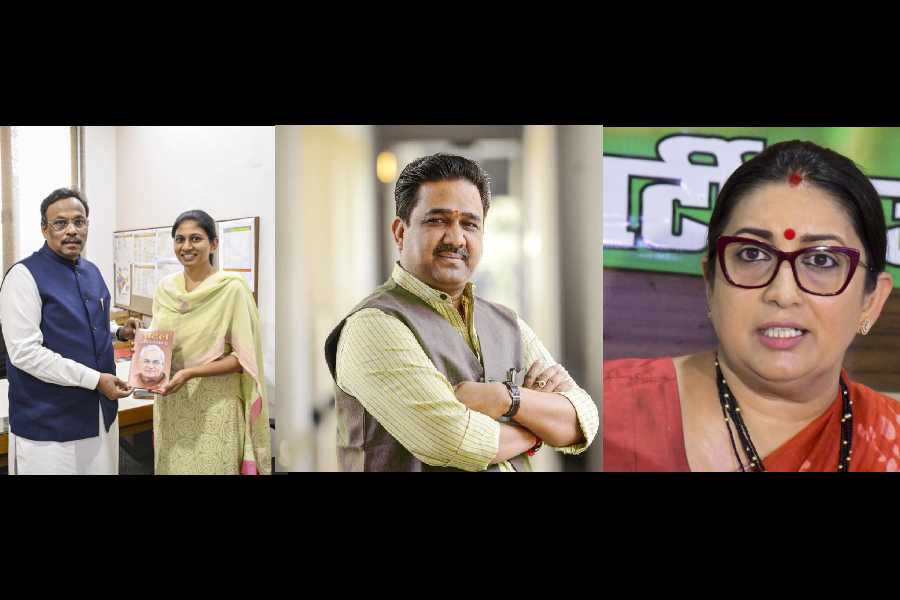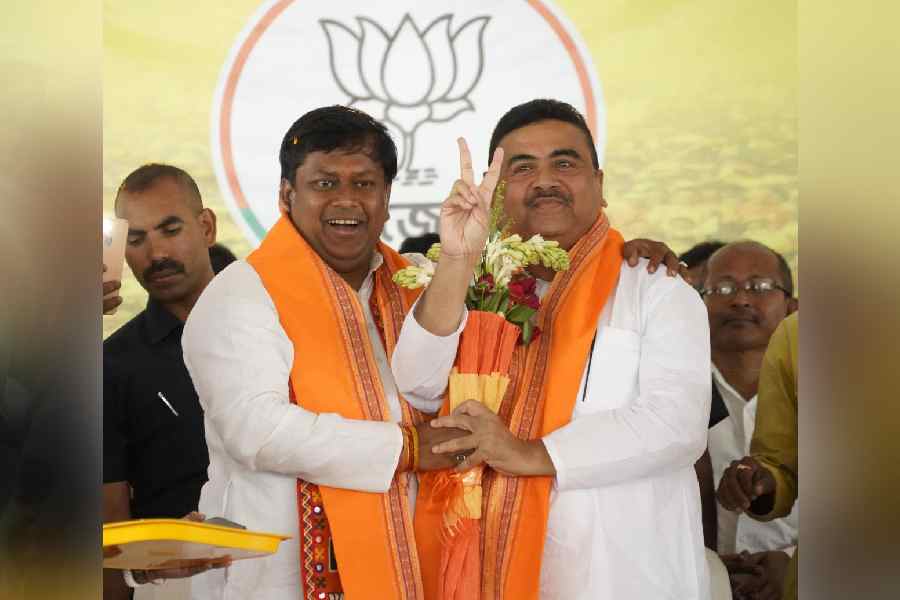NEW BJP BOSS: Among the more favoured entities of the Modi-Shah dispensation is that fabled being called the dark horse. They favour keeping folks puzzled over who they might pull out for what job from where. The mystery over who will replace
J.P. Nadda — back as Union health minister — as BJP president is typical of the ruling house-style.
Who will be the next boss of the “world’s largest” political party? Few know, and they aren’t telling. Those few probably haven’t even settled on a name yet.
Whoever could have ever guessed that Manohar Lal Khattar, a Punjabi, would be picked as chief minister of Jat-dominated Haryana in 2014? Or Mohan Yadav made chief minister of Madhya Pradesh last year? Or Bhajan Lal Sharma, a first-time MLA, in Rajasthan? Or Vishnu Deo Sai in Chhattisgarh? Or Mohan Charan Majhi in Odisha? All of these states had established BJP claimants for chief ministership; the Modi-Shah duopoly picked surprises everywhere.
But this time even they may not be in a position to unilaterally tick the name they wish to as head of the party.
Reason: The slide of the BJP into a minority and the necessity of having to use allies as crutches to form the government may have opened an opportunity for the parent outfit, the RSS, to make a return as arbiter on such matters.
A trailer of how assertive the Sangh could turn came recently when sarsanghchalak (RSS chief) Mohan Bhagwat appeared to grab the opportunity extended by the poll results to read out a sermon to the party and government bosses.
Bhagwat disapproved of the “arrogance” of the “sevak”; he slammed Modi-Shah’s handling of Manipur and wondered why the Opposition should be treated as an “adversary” and not a “counterpart”.
“The sarsanghchalak’s rare show of temper highlighted deep problems with the
current regime. The immediate fallout could be seen in who gets to head the
party organisation,” a BJP leader said. “The next BJP chief, if not selected by
the RSS, will have to be vetted by it.”
Nadda, whose name had been vetted by the RSS, was widely seen to have turned into a “rubber stamp” of the Modi-Shah regime. The RSS wouldn’t like a repeat, party leaders said.
Narendra Modi, however, is not one to cave in easily and many in the party feel that despite the adverse poll numbers, he wouldn’t accept someone he doesn’t approve of as head of the party.
They underscored how Modi had had his way in government formation by retaining all the key portfolios for his party and leaving precious little for the allies.
“Modiji may be down, but to assume he can be pressured would be foolish. If the Sangh thinks it can dictate terms now, it will be proved horribly wrong,” a key BJP leader said, suggesting Bhagwat’s stinging public criticism could turn Modi more obdurate.
Nadda’s extended term expires on June 30. The party’s top decision-making body, the parliamentary board, is empowered to further extend his term using the amended “emergency” clause in the party constitution. It can also appoint him “working president” till a new party chief is elected.
Alternatively, the board can appoint a new person as working president. Nadda had taken over as working president after the 2019 polls and was later elected unanimously in January 2020.
The process of electing the new president will start with a countrywide membership drive, set to be launched soon, followed by organisational elections at district and state levels. Party rules allow the election of the president to be taken up after the process is complete in at least half the state units.
Crucial Assembly elections in Maharashtra, Haryana and Jharkhand are due between October and December, and many in the party believe that the leadership would not want the president’s election to interfere with poll preparations.
The setback in the general election, too, has necessitated an organisational revamp at all levels based on a “thorough review of the poll results”, a party leader said.
The parliamentary board could meet soon to take the call on a working president. “A new full-time BJP chief may come only towards the end of the year,” a leader said.
Modi, therefore, has ample time to mend relations with the RSS and arrive at a choice acceptable to him and the Sangh.
By including in the Union cabinet former Madhya Pradesh chief minister Shivraj Singh Chouhan and other senior leaders with organisational experience, Modi has in a way hamstrung in advance any RSS attempt to stop a Modi-Shah rubber-stamp heading the party once again.
Chouhan, a former rival of Modi, could have fitted the Sangh’s bill as party chief.
Among those available, several names are doing the rounds. A look at some of the possible frontrunners:
Sunil Bansal, 54: Low profile but has an RSS background and is seen as a high performer. Currently a BJP general secretary, he was tasked with handling elections in three key states: Bengal, Odisha and Telangana.
While the Bengal results fell far below expectations, the BJP doubled its tally in Telangana and wrested power in Odisha for the first time while winning all but one of the state’s 21 Lok Sabha seats.
Bansal had handled Uttar Pradesh in the past. He is close to Modi and Shah and the RSS will not have issues with him.
Vindo Tawde, 60: The Maratha leader has emerged as one of the most powerful BJP general secretaries. Known to enjoy Shah’s confidence, he headed the team tasked with poaching Opposition leaders ahead of the Lok Sabha polls.
Crucially, the phone calls to the would-be ministers in Modi’s 3.0 government, inviting them to tea at the Prime Minister’s residence, went out from him.
Tawde rose through the ranks starting with RSS student wing ABVP. With elections approaching in Maharashtra, a state where the BJP’s general election showing was miserable, he may be used to woo the Marathas, agitating for inclusion in the OBC reservation list.
K. Laxman, 63: A Rajya Sabha MP, he currently heads the party’s OBC Morcha. Laxman, who hails from Telangana where he was state party chief and two-term MLA, is efficient in handling organisational matters.
He is seen as a strong contender, with the BJP eyeing expansion in the south. His OBC identity is an added advantage. He is, however, seen as a yes-man to Modi-Shah, which could invite objections from the RSS.
There is, however, strong speculation that a “young and dynamic leader” could be picked to bolster the BJP’s tagline of “party with a difference”. The names of former Union ministers Anurag Singh Thakur and Smriti Irani are being discussed.












